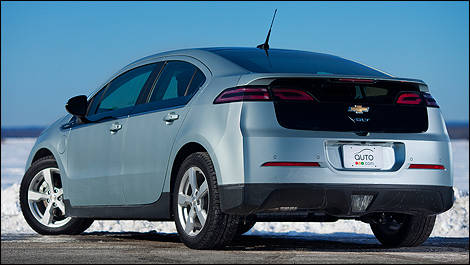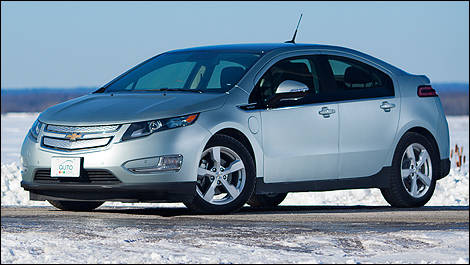Last fall, I test drove and reviewed a 2011 Nissan LEAF. As luck would have it, I was faced with a minor crisis on only the second day of my week-long test and with it, I learned first-hand the meaning of range anxiety (RA).
Recently, I spent a week at the wheel of the 2012 Chevrolet Volt. Even if these cars are meant to compete for the same miniscule slice of the market, they are incredibly different. Between the most common EVs (LEAF, Volt, Mitsubishi i-MiEV), they only account for roughly 0.01% of all new-car sales in North America. Thought I'd let you know how they're doing...
Back to the Chevrolet Volt. As you may know, it’s equipped with a range-extending gasoline-powered engine. Vulgarly, it recharges the batteries in order for the driver keep going along his/her merry way once the battery is discharged.
This ingenious system works. At no point did the thought ever cross my mind that I might get stranded, quite unlike my drives with the LEAF and i-MiEV. The Volt has a 40 to 80 km full-EV range which depends greatly on weather conditions, system power requirements and the driver's right foot. Obviously, the same is true for both the LEAF and the i-MiEV and any other plug-in vehicle.
Unlike the other two, the Volt need not be plugged in at nearly every stop in order to keep going. For the foreseeable future, this car poses the best alternative given that charging stations are still few and far between. Given this, you'd think that the Volt would outsell the LEAF, but it doesn't.
About the Nissan LEAF, I learned after the fact that its estimated range is a calculated mix of current, recent past and many past weeks' driving. That explains why a full charge would result in a posted range of 120 km one day and 145 km a few days later. Call these algorithms a built-in “safety” feature by Nissan for the user.
In other words, and more often than not, the EV will be able to take you farther than the actual indicated range. For many, including me, that will be a tough lesson to learn. Our current society is so number- and statistic-based and bombarded that when we see a number, we consider it the truth, a fact, an unquestionable piece of data. RA could be defined by this.
So, in essence, range anxiety need not be as bad as even I made it out. What is especially interesting is that Nissan has clearly stated that they will not increase the LEAF's range anytime soon while Chevrolet boasts the fact that it has the answer to RA.
What gives then, if consumers are picking the LEAF 2 to 1 over the Volt? Could it be that the super-hybrid that is the Volt is too avant-garde? I would think so. People are familiar with hybrids and electric cars. Range-extended EVs are still a foreign concept, or so it would seem.
In the end, I think there's room for them all but the most promising mid-term solution is the Volt's technology. It will become pointless when batteries offer 500+km ranges and can be fully recharged in under 10 minutes. Either that or when battery swap stations will be able to replace your depleted battery by a freshly charged one in mere moments.
Recently, I spent a week at the wheel of the 2012 Chevrolet Volt. Even if these cars are meant to compete for the same miniscule slice of the market, they are incredibly different. Between the most common EVs (LEAF, Volt, Mitsubishi i-MiEV), they only account for roughly 0.01% of all new-car sales in North America. Thought I'd let you know how they're doing...
Back to the Chevrolet Volt. As you may know, it’s equipped with a range-extending gasoline-powered engine. Vulgarly, it recharges the batteries in order for the driver keep going along his/her merry way once the battery is discharged.
 |
| 2012 Chevrolet Volt (Photo: Sébastien D'Amour/Auto123.com) |
This ingenious system works. At no point did the thought ever cross my mind that I might get stranded, quite unlike my drives with the LEAF and i-MiEV. The Volt has a 40 to 80 km full-EV range which depends greatly on weather conditions, system power requirements and the driver's right foot. Obviously, the same is true for both the LEAF and the i-MiEV and any other plug-in vehicle.
Unlike the other two, the Volt need not be plugged in at nearly every stop in order to keep going. For the foreseeable future, this car poses the best alternative given that charging stations are still few and far between. Given this, you'd think that the Volt would outsell the LEAF, but it doesn't.
About the Nissan LEAF, I learned after the fact that its estimated range is a calculated mix of current, recent past and many past weeks' driving. That explains why a full charge would result in a posted range of 120 km one day and 145 km a few days later. Call these algorithms a built-in “safety” feature by Nissan for the user.
In other words, and more often than not, the EV will be able to take you farther than the actual indicated range. For many, including me, that will be a tough lesson to learn. Our current society is so number- and statistic-based and bombarded that when we see a number, we consider it the truth, a fact, an unquestionable piece of data. RA could be defined by this.
So, in essence, range anxiety need not be as bad as even I made it out. What is especially interesting is that Nissan has clearly stated that they will not increase the LEAF's range anytime soon while Chevrolet boasts the fact that it has the answer to RA.
What gives then, if consumers are picking the LEAF 2 to 1 over the Volt? Could it be that the super-hybrid that is the Volt is too avant-garde? I would think so. People are familiar with hybrids and electric cars. Range-extended EVs are still a foreign concept, or so it would seem.
In the end, I think there's room for them all but the most promising mid-term solution is the Volt's technology. It will become pointless when batteries offer 500+km ranges and can be fully recharged in under 10 minutes. Either that or when battery swap stations will be able to replace your depleted battery by a freshly charged one in mere moments.
 |
| 2012 Chevrolet Volt (Photo: Sébastien D'Amour/Auto123.com) |


